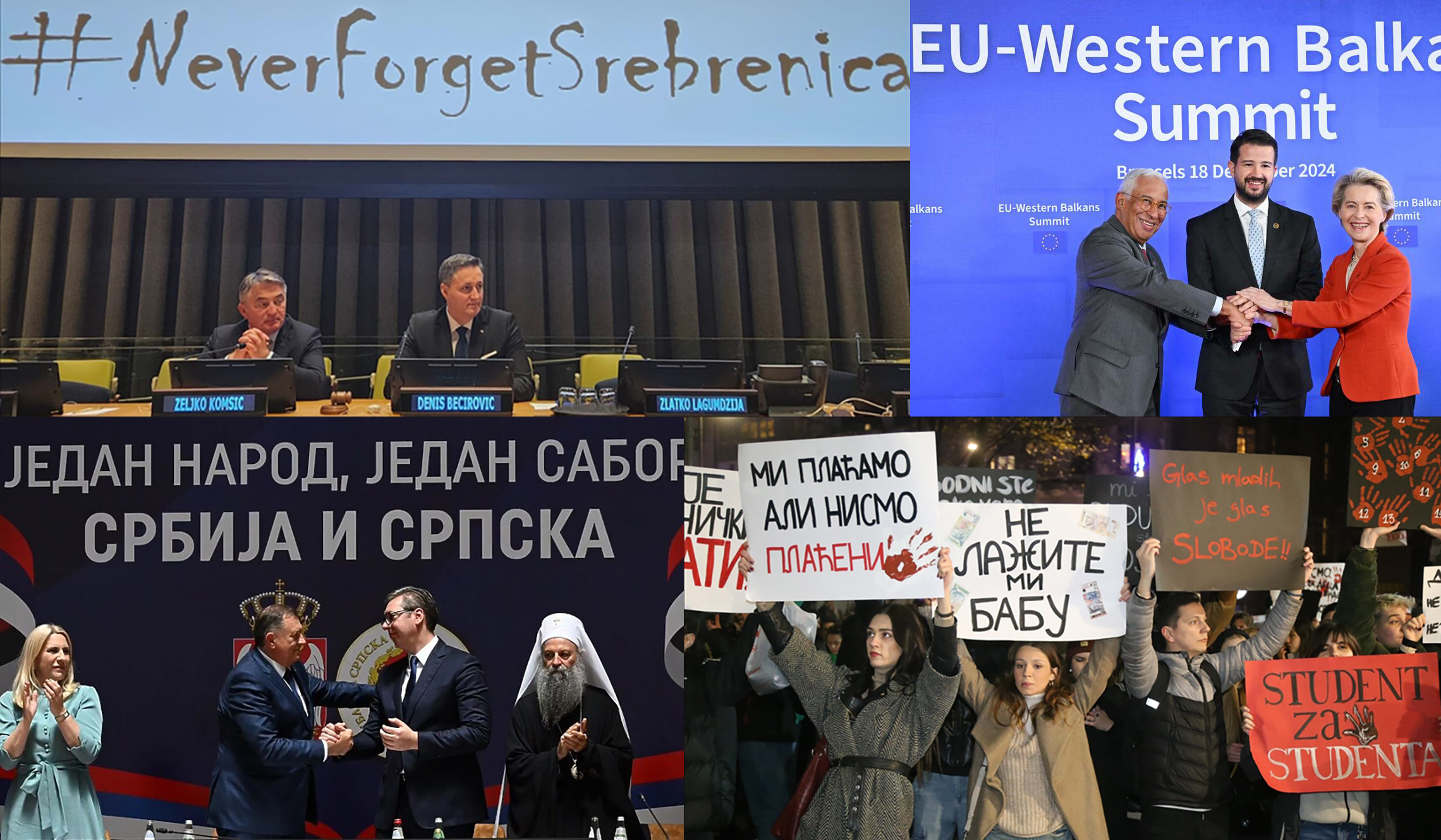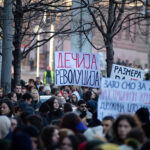The most high-profile events in the Western Balkans in 2024:
• Intensification of the European integration process of the Western Balkan countries; old and new challenges of the EU integration in most countries of the region.
• The dialogue between Belgrade and Priština is “at a deadlock”.
• UN General Assembly Resolution on Srebrenica and Belgrade’s response.
• Mass protests of students and the increasingly complex domestic political situation in Serbia at the end of the year.
The UN Resolution
The preparation and adoption of the Resolution on the Srebrenica Genocide at the UN General Assembly in May has triggered a wave of strong indignation among the Serbian leadership. A kind of response was a campaign to support the national spirit and the “All-Serbian Assembly” in Belgrade as the main event of it.
In the region, the Serbian campaign was perceived as an attempt to revive the Greater Serbia ideology with dangerous consequences. One of these consequences (unexpectedly) was the aggravation of Montenegrin-Croatian relations and the complication of Montenegro’s European integration.
Montenegro’s EU Process Is Moving Faster, but…
Montenegro became the first candidate to receive a positive IBAR in the area of the rule of law at the EU Intergovernmental Conference held at the end of June. It unlocked the opportunity to close other chapters in the accession negotiations. For the first time in seven years, Montenegro closed three negotiation chapters in December of this year.
However, Podgorica has failed to meet the planned benchmarks under four closed chapters due to the position of Croatia, which reminded its neighbor of a number of unresolved bilateral issues, mainly those from the war in the early 1990s, namely border delimitation, punishment of war criminals, search for missing persons, and compensation for camp prisoners…
Zagreb was particularly dissatisfied with a Resolution on Genocide in Jasenovac, adopted by the Montenegrin parliament. Officially, the Croatian side called this step as extremely unfriendly. Unofficially – an attempt by pro-Serbian forces in Montenegro to “revenge” for the UN General Assembly Resolution on Srebrenica. However, Montenegrin and European high-ranking officials are optimistic about resolving all controversial issues between Zagreb and Podgorica in the near future and unblocking the opening of the next negotiation chapters.
Albania Finally Begins the EU Accession Talks
In 2024, Albania finally began proper talks on joining the European Union. In October, the country opened Cluster 1, consisting of five negotiation chapters, and in December – Cluster 6, consisting of two chapters. Thus, Albania became the first EU candidate country to open two Clusters in just two months.
North Macedonia Is “Stucked” in the European “Waiting Hall”
Tirana has managed to make a breakthrough in European integration process not only thanks to its own efforts, but also thanks to Brussels’ political decision to decouple Albania’s accession path from North Macedonia’s ones. This step, on the one hand, is positive for Tirana, but on the other hand, Skopje now has to overcome the Bulgarian veto on its own.
Later, it seemed that a Bulgarian-Macedonian compromise was reached, and North Macedonia had only one step left to unblock its European integration progress – to add Bulgarians in the Constitution as a state-forming people. But the ruling VMRO-DPMNE party in Skopje (who are against Sofia’s concessions without clear guarantees of EU accession) has put North Macedonia’s European integration “on pause.”
Serbia’s European Integration Is Suspended
Serbia was unable to fully continue the EU accession negotiations and open Cluster 3 in 2024, as was planned by Belgrade and Budapest. The Hungarian Presidency of the European Union was supposed to be as favorable as possible for Serbian European integration. However, despite the fact that at the end of the year, the European Commission once again emphasized Serbia’s technical readiness to open another Cluster, the EU member states failed to reach an agreement on this. It was officially stated that the EU Council would revert to this issue “on the basis of substantial further progress by Serbia,” in particular in the rule of law and normalization of relations with Kosovo.
One of the important reasons in the actual “freezing” of the negotiation process is Belgrade’s refusal to harmonize its foreign policy with the European one, namely to impose sanctions against the Russian Federation in connection with the Russian aggression against Ukraine. However, given Brussels’ focus on other problematic issues, Belgrade remains hopeful that Serbia’s disregard for the EU’s sanctions policy could not affect the accession process.
Bosnia and Herzegovina Cannot Boast of Success in European Integration
At the beginning of the year, there was hope for a European integration breakthrough for Bosnia and Herzegovina. At the end of March 2024, the European Union member states agreed to start BiH’s accession negotiations with the EU, provided that the country meets all the conditions set by the European Commission. However, by the end of the year, Brussels has not seen the country’s progress in implementing the necessary reforms.
Due to insufficient reform efforts, Bosnia and Herzegovina was unable to attract funds from a new EU program aimed at supporting the region.
In early May 2024, the EU Council adopted the Growth Plan for the Western Balkans. It is designed to receive assistance in the amount of 6 billion euros for the region – 2 billion euros are direct payments to the budget and 4 billion euros are soft loans.
At the end of October, the European Commission approved the Economic Reform Programmes of Albania, Kosovo, Montenegro, North Macedonia and Serbia. The five Western Balkan countries committed to socio-economic and fundamental reforms as a prerequisite for receiving funds under the Growth Plan. However, the BiH failed to adopt the Programme with all Brussels’ requirements and currently does not have access to the funds provided for by the Plan.
Another Bad Year for Kosovo’s European Integration
Kosovo failed to obtain EU candidate status in 2024. In addition, the Brussels’ restrictive measures against Priština are in force (due to the insufficient efforts of the Kosovo authorities in dialogue with Belgrade under the EU mediation).
In 2024, the authorities in Priština, led by Albin Kurti, continued efforts to establish their own state, which were repeatedly criticized by Western diplomats. This policy did not contribute to Kosovo’s rapprochement with the EU.
Belgrade-Priština Dialogue Hasn’t Significant Results
The lack of tangible progress in the Belgrade-Priština dialogue is one of the most negative outcomes of 2024.
In 2023, after the Agreement on the Path to Normalization between Kosovo and Serbia and the Implementation Annex, some progress was allegedly seen. But the following year did not bring any fundamental changes.
The absence of escalations (like in Banska) was a positive dynamic. But it is clear that it is impossible to ensure the stability of the security situation in the region without real steps towards Belgrade-Priština comprehensive normalization of relations.
A Tense Domestic Political Situation in Serbia
The tragedy in Novi Sad on November 1, when the collapse of a canopy at a reconstructed railway station caused the tragic death of 15 people, caused a wave of mass protests. By the end of the year, a huge number of student youth took part in the protest movement, and dozens of universities across the country were blocked.
The rally on December 22 in the center of Belgrade was the largest since the Milosevic regime. Tens of thousands of students together with citizens demanded the punishment for those responsible for the Novi Sad tragedy.
The country’s leadership prefers to consider these protests not as a manifestation of discontent, but as a hybrid war against Serbia. The Serbian leadership’s attempts to seek support in Moscow and Beijing “to combat color revolutions” can only deepen the crisis next year.



